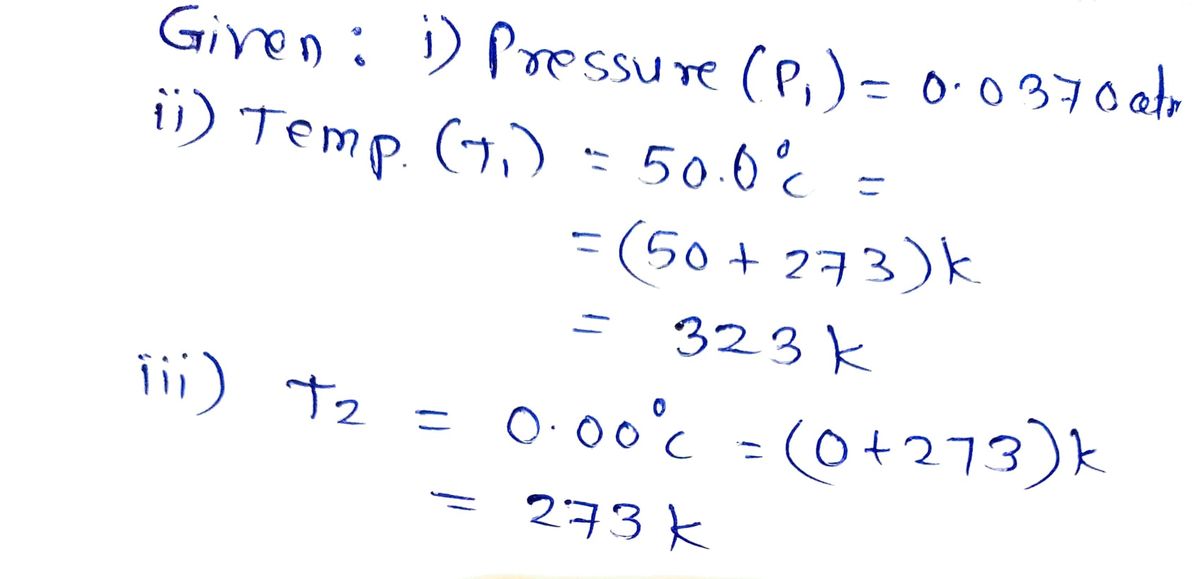co 564 ml Charles's Law (temperature, volume) 1) A 550.0 mL sample of nitrogen gas is warmed from 77 °C to 86 °C. Find its new volume if the pressure remains constant. = √₂ T₁ T₂ 2.22 L 350 k 2) A gas occupies 1.00 L at 0.00°C. What is the volume at 333.0 °C? V₁=1.00L 1₁ V₂ = V₁ = 1 Та 21300 L V₁=550.0 mL T₁ = 77°c = (77+273)k = 350k Gas Laws Worksheet -86°C (86+273)K=359K 26.6 L 318 K V₁ V₂ V2= Vita : (550.0 mL) x (359k) T₁ Boyle's Law (pressure, volume) 3) Convert 338 L at 63.0 atm to its new volume at 1.00 atm. P.V₁ Pals .0313 atm -564mL 1+₁=0,00°C = 10.00+273) K=273k To 333.0°C (333.0 +273 K = 606 K 2.222 V₂ = V₁Ta - (1.00 L) x (6061) _ 273K V₂ = Pa 4) A tank of nitrogen has a volume of 14.0 L and a pressure of 760.0 mm Hg. Find the volume of nitrogen when its pressure is changed to 400.0 torr while the temperature is held constant. P₁=63.0 atm V₁ = 338 L or 2.13 x 10 L = (63.0 atm) X (338L) = 2.13X10" L Pa = 1.06A+m 7.00 atm 5) What pressure (mm Hg) is required to compress 196.0 liters of air at 1.00 atmosphere into a cylinder whose volume is 26.0 liters? 5730 mmHg Gay-Lussac's Law (temperature, pressure) 6) A gas has a pressure if 0.0370 atm at 50.0 °C. What is the pressure at 0.00 °C? k 7) If a gas in a closed container, with an original temperature of 25.0 °C, is pressurized from 15.0 atmospheres to 16.0 atmospheres, what would the final temperature of the gas be?
Ideal and Real Gases
Ideal gases obey conditions of the general gas laws under all states of pressure and temperature. Ideal gases are also named perfect gases. The attributes of ideal gases are as follows,
Gas Laws
Gas laws describe the ways in which volume, temperature, pressure, and other conditions correlate when matter is in a gaseous state. The very first observations about the physical properties of gases was made by Robert Boyle in 1662. Later discoveries were made by Charles, Gay-Lussac, Avogadro, and others. Eventually, these observations were combined to produce the ideal gas law.
Gaseous State
It is well known that matter exists in different forms in our surroundings. There are five known states of matter, such as solids, gases, liquids, plasma and Bose-Einstein condensate. The last two are known newly in the recent days. Thus, the detailed forms of matter studied are solids, gases and liquids. The best example of a substance that is present in different states is water. It is solid ice, gaseous vapor or steam and liquid water depending on the temperature and pressure conditions. This is due to the difference in the intermolecular forces and distances. The occurrence of three different phases is due to the difference in the two major forces, the force which tends to tightly hold molecules i.e., forces of attraction and the disruptive forces obtained from the thermal energy of molecules.

Given :

Step by step
Solved in 2 steps with 2 images









